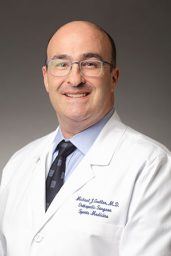While it may take a bit of research, finding a surgeon that combines surgical skill with a collaborative philosophy of care will help ensure you have a positive experience – an optimal outcome.
Questions to Ask Your Surgeon
The right surgeon should earn your trust and make you feel confident and comfortable about his or her abilities:
- Do they talk openly and honestly?
- Do they take the time to answer your questions?
- Are they caring and empathetic?
- Do they explain all of your options, including the risks?
- Do they involve you in decisions about your care?
- When you are finished talking, do you feel that you understand what is wrong and the options?
Even the most common surgical procedures carry some level of risk. To learn more about a surgeon’s track record, consider asking:
- How many times have you performed this procedure this year?
- How involved were you in each surgery?
- Did you handle the opening incision? The closing sutures?
- What role do residents and other practitioners play in this procedure?
- What are the risks of this procedure?
- What’s your complication rate?
- What are the most common complications and how are they treated?
- What will make this a successful surgery?
- How long can I expect my recovery to take?
- How will I feel in one month? Two months? Three months?
It may be helpful to ask your primary care physician who he or she recommends as well.
Let’s Talk About Training
Some may say the only option for highly skilled surgical care is in New York City or Philadelphia. However, where a surgeon completed his or her training is more important than where they practice now. Urban hospitals may be bigger and appear to have more clinical clout than a local hospital, but it’s really each surgeon’s individual skill that’s most important. Look at a surgeon’s credentials, particularly if he or she is board certified and where the surgeon completed training, residency and fellowship. Their training and track record are more important than where they currently practice.
Find Out About Follow Up
Your surgery may require multiple follow-up appointments, which can be stressful, costly, time consuming and physically exhausting when you’re recuperating, especially if you’ll need to travel a significant distance to appointments.
Ask your surgeon about the complexity of the procedure and the level of follow-up care that will be required:
- Will I need a home health nurse or special equipment?
- How difficult will it be to get a follow-up appointment?
- Will I see you at my follow-up appointment or a nurse?
Read the Reviews
Online reviews aren’t always the best barometer of a physician’s clinical acumen but they can provide insight into a surgeon’s bedside manner and how the support staff treats patients. Look for reviews that seem authentic and include specific information about the experience.
Armed with the answers to the questions above, decide what matters most to you about your care and the surgeon that you will entrust with it.
About CentraState Medical Center
Choosing a local facility means you’ll not only have the convenience of being close to home, but you’ll also have access to seasoned, highly skilled surgeons and cutting-edge surgical options.
The board-certified orthopedic surgeons at CentraState Medical Center use the most advanced technology to perform minimally invasive surgical techniques. You’ll receive the highest quality of care, including the latest protocols in anesthesia, pain management and rehabilitation, so you’ll recover with the best possible outcome.
For more information about orthopedic services at CentraState Medical Center, call (866) CENTRA7. To find an orthopedic surgeon, visit our physician finder.
 Michael J. Greller, MD, MBA, CPE, FAAOS, is a board-certified and fellowship-trained orthopedic surgeon and Chief of Staff at CentraState Medical Center in Freehold.
Michael J. Greller, MD, MBA, CPE, FAAOS, is a board-certified and fellowship-trained orthopedic surgeon and Chief of Staff at CentraState Medical Center in Freehold.





